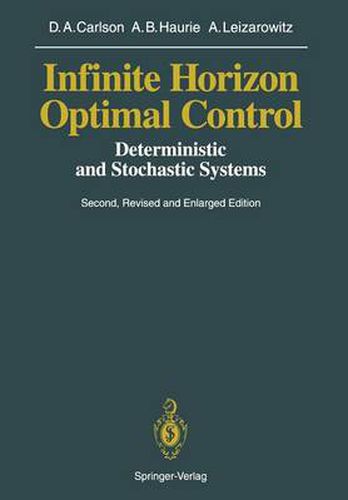Readings Newsletter
Become a Readings Member to make your shopping experience even easier.
Sign in or sign up for free!
You’re not far away from qualifying for FREE standard shipping within Australia
You’ve qualified for FREE standard shipping within Australia
The cart is loading…






This title is printed to order. This book may have been self-published. If so, we cannot guarantee the quality of the content. In the main most books will have gone through the editing process however some may not. We therefore suggest that you be aware of this before ordering this book. If in doubt check either the author or publisher’s details as we are unable to accept any returns unless they are faulty. Please contact us if you have any questions.
This monograph deals with various classes of deterministic and stochastic continuous time optimal control problems that are defined over unbounded time intervals. For these problems the performance criterion is described by an improper integral and it is possible that, when evaluated at a given admissible element, this criterion is unbounded. To cope with this divergence new optimality concepts, referred to here as overtaking optimality, weakly overtaking optimality, agreeable plans, etc. , have been proposed. The motivation for studying these problems arises primarily from the economic and biological sciences where models of this type arise naturally. Indeed, any bound placed on the time hori zon is artificial when one considers the evolution of the state of an economy or species. The responsibility for the introduction of this interesting class of problems rests with the economists who first studied them in the modeling of capital accumulation processes. Perhaps the earliest of these was F. Ramsey [152] who, in his seminal work on the theory of saving in 1928, considered a dynamic optimization model defined on an infinite time horizon. Briefly, this problem can be described as a Lagrange problem with unbounded time interval. The advent of modern control theory, particularly the formulation of the famous Maximum Principle of Pontryagin, has had a considerable impact on the treat ment of these models as well as optimization theory in general.
$9.00 standard shipping within Australia
FREE standard shipping within Australia for orders over $100.00
Express & International shipping calculated at checkout
This title is printed to order. This book may have been self-published. If so, we cannot guarantee the quality of the content. In the main most books will have gone through the editing process however some may not. We therefore suggest that you be aware of this before ordering this book. If in doubt check either the author or publisher’s details as we are unable to accept any returns unless they are faulty. Please contact us if you have any questions.
This monograph deals with various classes of deterministic and stochastic continuous time optimal control problems that are defined over unbounded time intervals. For these problems the performance criterion is described by an improper integral and it is possible that, when evaluated at a given admissible element, this criterion is unbounded. To cope with this divergence new optimality concepts, referred to here as overtaking optimality, weakly overtaking optimality, agreeable plans, etc. , have been proposed. The motivation for studying these problems arises primarily from the economic and biological sciences where models of this type arise naturally. Indeed, any bound placed on the time hori zon is artificial when one considers the evolution of the state of an economy or species. The responsibility for the introduction of this interesting class of problems rests with the economists who first studied them in the modeling of capital accumulation processes. Perhaps the earliest of these was F. Ramsey [152] who, in his seminal work on the theory of saving in 1928, considered a dynamic optimization model defined on an infinite time horizon. Briefly, this problem can be described as a Lagrange problem with unbounded time interval. The advent of modern control theory, particularly the formulation of the famous Maximum Principle of Pontryagin, has had a considerable impact on the treat ment of these models as well as optimization theory in general.